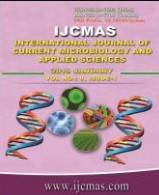


 National Academy of Agricultural Sciences (NAAS)
National Academy of Agricultural Sciences (NAAS)

|
PRINT ISSN : 2319-7692
Online ISSN : 2319-7706 Issues : 12 per year Publisher : Excellent Publishers Email : editorijcmas@gmail.com / submit@ijcmas.com Editor-in-chief: Dr.M.Prakash Index Copernicus ICV 2018: 95.39 NAAS RATING 2020: 5.38 |
Neuropeptides (protein molecules) are synthesised in the neurons, helps to communicate the impulse from the stimulant to the receptor. Neuropeptides are responsible for regulating a various physiological functions including development, metabolism, water and ion homeostasis, and as neuromodulators in circuits of the central nervous system. Neuropeptides are different from neurotransmitters because, former releases in the haemolymph and the later releases in the neuro-neuro junction or in the neuro-muscular junction. The first neuropeptide isolated from Periplanata Americana was protocolin in the year 1975 which helps in muscle contractions in hindgut, reproductive, skeletal and heart muscle. At present a total of 4782 insect neuropeptide records were obtained which perform various related physiological functions. Thus it paves the way for the generation of novel type of putative insect control agents based on backbone cyclic (BBC) peptidomimetic antagonists of insect-neuropeptides. At present four different neuropeptides such as proctolin, kinin, pheromone biosynthesis activating neuropeptide (PBAN) and allatostatin were studied thoroughly and their biologically active sequence were identified. Using this sequence peptidomimetic analogues (either as agonists or antagonists) were synthesized in automated peptide synthesizer and tested for their efficacy as insecticide. Among those four PBAN showed good result as insecticide by reducing pheromone production up to 73% in Helicoverpa peltigera. Based on this many neuropeptides were under in vitro test for their antagonist activity. In 2016, a synthetic antagonistic neuropeptide based on pheromone biosynthesis activating neuropeptide was registered for patent by Altstein. This neuropeptide based insecticide is highly insect specific and can be incorporated as apart in integrated pest management though the production of synthetic peptide is critical.
 |
 |
 |
 |
 |